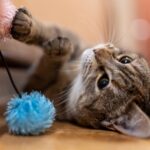Cats and Birds in the News

For nearly a decade, the Stewardship Centre for BC’s Cats and Birds project has promoted responsible cat ownership and best practices to protect wildlife from free-roaming cats. Over the past year, public concerns and input from humane organizations have continued to emphasize this issue’s importance for wildlife conservation efforts and cat welfare.
Provincial News about Roaming Cats
A Smithers resident called on the town council to ban roaming cats, sparking a debate about responsible cat ownership in the community. In Prince George, researchers studied different attitudes towards free-roaming cats and highlighted the tension caused within communities due to cats’ impact on wildlife and neighbourhood disputes.
For many, roaming cats are viewed as a nuisance and a threat to other animals. In June, one Langley woman’s dog was severely attacked by a group of domestic cats. This incident and the lack of cat control regulations prompted the owner to advocate for bylaws similar to those in other municipalities. The story gained traction on social media, drawing attention to the need for better regulation.
Animal welfare organizations are also raising concerns about overpopulation and limited financial support. In Kamloops, the BC SPCA is struggling with rising cat care costs and limited intake capacity, emphasizing the financial strain placed on these organizations. A stark example of the burden on these organizations is the massive cat rescue operation in Williams Lake, where the BC SPCA rescued 280 stray cats from a single property after years of residents abandoning their cats there. This operation highlighted the pressing need for community awareness and support in managing stray cat populations.
Some community members are taking proactive measures in response to these issues. A Lake Cowichan resident proposed a feral cat feeding station to manage and care for the local feral cat population. Researchers at Thompson Rivers University are also advocating for better cat ownership practices, including using “catios” to prevent roaming while providing a safe way for cats to enjoy the outdoors.
A new documentary, “My Pet Assassin,” by CBC
CBC’s new short documentary, titled “My Pet Assassin,” uncovers the hidden predatory instincts of domestic cats and their impact on wildlife. Despite being well-fed and pampered, cats retain their natural hunting behaviours, often preying on small animals like birds and rodents. Sarika Cullis-Suzuki investigates the ecological consequences of these behaviours and explores solutions to keep both cats and wildlife safe, such as keeping cats indoors, building catios, or using products like bird-safe collars.
The documentary also highlights the Vancouver Cat Count, which was launched in 2020 by SCBC’s Cats and Birds team in partnership with the University of Guelph and Environment and Climate Change Canada to map domestic and feral cats across the city. The CBC article “Your Pet Cat is Probably a Killer, But It Doesn’t Have to Be That Way” provides additional context to the documentary and the research it referenced.
Animalogic: “Cats Kill Billions Of Birds Every Year. It’s Time For That To Stop.”
Animalogic is an online nature and education channel on YouTube with over two million subscribers. In collaboration with Nature Canada, Animalogic published an episode that focuses on the issue of roaming cats and has since gained over 57,000 views in just two weeks! Their insightful video shows on-the-ground footage of roaming cats, demonstrating their impact on wild bird populations. The video also highlights research conducted by Dr. Elizabeth Gow, the scientific advisor and a key partner to our Cats and Birds project. Thanks to engaging footage and factual reporting, their video helps to understand the multidimensional issues of roaming cats and provides practical solutions for cat owners.
In conclusion
Domestic cats are beloved pets worldwide, known for their companionship and playful nature. However, beneath their adorable exterior lies a powerful hunter with instincts that can have significant ecological consequences. By adopting responsible pet ownership practices, we can ensure the safety and well-being of our pets while protecting local ecosystems. Small changes can make a significant difference, whether through keeping cats indoors, building catios, or using bird-safe collars.





